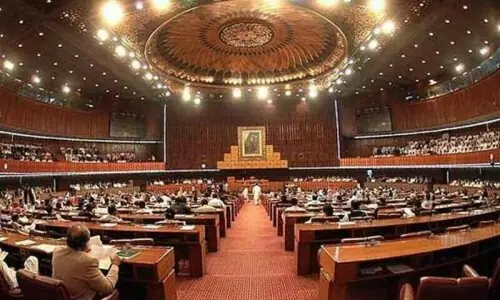The government confines its performance evaluation on the National Action Plan to the number of arrests made and raids conducted, not realising that NAP is much more than that. It is, inter alia, about capacity building of civilian institutions dealing with terrorism, developing counter narratives to militants, and above all, coordinating the national counterterrorism (CT) effort. To pin down the government on these areas, we need to ask the right questions.
There are, at least, five areas to be addressed by the government to show its commitment and seriousness in implementing NAP.
Making Nacta effective
Nacta has been given the role of monitoring implementation of NAP by the prime minister. Eleven months down the road, Nacta has still to take off, indicating a lack of seriousness on the part of the government. As per the Nacta Act, holding a meeting of the board of governors, headed by the prime minister, is an essential prerequisite for making Nacta functional, because the board is responsible for providing initial vision, guidelines and empowerment to Nacta. The civilian government failed to call even a single meeting of the Nacta board of governors in the last one year. Implementation of NAP, without the activation of its monitoring body, Nacta, shall continue to be lopsided leading to an impression that the civilian government is not playing its due role.
Choking terrorist financing
NAP lays great emphasis on choking the terrorists’ funds. Detecting and investigating cases of terrorist financing is much more complex than the normal criminal investigation carried out by local police and needs specially trained investigators. In the entire country, FIA is the only organisation with a dedicated Terrorist Finance Investigation Unit. The level of seriousness of the civilian government can be judged from the fact that the TFIU has been without a professional head, and working with a skeleton staff, for the last many years.
The government has to address at least five areas to show its commitment to implementing NAP.
The TFIU’s performance so far, and the road map of enhancing its capability besides setting up such units in provincial CT departments are questions which the government needs to answer. Government claims of being serious about dealing with terrorist financing are not likely to hold much water without developing appropriate investigation outfits at the federal and provincial level manned by experts.
Countering militants on internet
Internet has emerged as an important means of not only projecting the propaganda of the militants, but also for recruitment, funds collection, imparting training etc. NAP rightly lays emphasis on dealing with the issue. There is no clarity about which organisation, at the national level, is responsible for monitoring the militants’ activities on the internet and countering these. Besides, investigation of cases of the internet’s use by terrorists is an area that requires specific expertise. FIA has dedicated units like the National Response Centre for Cyber Crimes to investigate such cases; unfortunately, these have not been provided the wherewithal to deliver, nor have similar units been set up in provincial CTDs. Would the interior minister and the chief ministers like to respond?
Action against members of banned militant organisations
According to the Anti-Terrorism Act, the members of banned militant groups are not permitted arms licences, passports, travel abroad or financial facilities. We need to ask the government whether the lists of members of banned groups have been shared with all relevant stakeholders and how many of these members have had their arms licences/ passports/ ATMs/ credit cards/ bank accounts cancelled? None, I am afraid.
Strengthening the criminal justice system
NAP highlights the importance of capacity building of the criminal justice system ie courts, police, prosecution and prisons.
Courts
In view of the high rates of acquittals of terrorists from the anti-terrorism courts, parliament amended the Constitution to set up military courts for a period of two years, for cases of terrorism. One year has elapsed and after another year, the government shall either have to continue with the military courts or revert the terrorism cases to the ATCs. The government has not shared with us the road map to enhance the capacity of ATCs to dispense justice in terrorism cases, when the period of military courts expires. Would it like to do so now?
Police
Whenever the government talks of enhancing the CT capability of police, the emphasis is on raising specialised units with better military capabilities. That is important, indeed, but ignoring the importance of normal policing as an effective plank of CT is a critical mistake.
The two most important areas to be addressed are improving the quality of investigation of terrorism cases and secondly, bridging the trust deficit between police and the community so that it shares the relevant information about terrorists with the police.
Improving the quality of investigation requires better training, use of technology, forensic labs and national databases. The only national database of fingerprints of criminals, called Pakistan Automated Fingerprints Identification System, is nonfunctional for many years and the government has made no effort to make it functional post-NAP. Similarly, no national level policy or effort to bridge the trust deficit between the public and police exists. True, that under the 18th Amendment policing is a provincial subject, but there is no bar on having a national policy on this crucial issue as a national guideline on CT
Prosecution
No matter how good the investigation, if the prosecution fails to establish the cases in the courts, the terrorists are likely to be acquitted. The refusal of the prosecutors of the Safoora Goth massacre to prosecute the case due to nonpayment of salaries and inadequate security is a cause for serious concern. What measures have been taken by the government to address the weak areas for successful prosecution of terrorism cases?
Prisons
The jailbreaks of Bannu and Dera Ismail Khan, leading to the fleeing of hundreds of imprisoned terrorists, highlight the importance of prisons. Would the government like to share its road map for making high security prisons and progress post-NAP on this?
The prevailing perception that the government is not serious about NAP implementation erodes public support. Addressing these questions, therefore, is in the government’s own interest.
The writer is a retired police officer.
Published in Dawn, December 28th, 2015

































